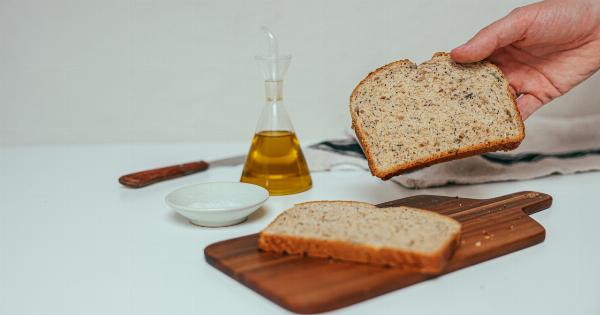Testosterone is a hormone that plays a crucial role in many aspects of a man’s health, including muscle mass, bone density, and libido. It is also vital for women, but in smaller quantities.
Healthy testosterone levels are essential for overall well-being, making it imperative to maintain them at an optimal level. While some foods can naturally boost testosterone production, others can have the opposite effect. In this article, we will discuss ten foods that you should avoid if you want to maintain healthy testosterone levels.
1. Soy and Soy-based Products
Soy-based products, such as tofu and soy milk, are known to contain phytoestrogens, which are compounds that mimic estrogen in the body. Estrogen is the primary female sex hormone and is responsible for lowering testosterone levels.
By consuming soy products regularly, you may disrupt the delicate hormonal balance and negatively impact your testosterone levels.
2. Alcohol
While having an occasional drink may not have a significant impact, excessive alcohol consumption can harm your testosterone levels. Alcohol is known to increase the conversion of testosterone into estrogen, leading to imbalances.
It can also damage the Leydig cells in the testes, which are responsible for testosterone production.
3. Flaxseeds
Flaxseeds are commonly considered a healthy food due to their high fiber and omega-3 fatty acid content. However, they are also rich in lignans, a type of plant compound that can inhibit testosterone production.
If you want to maintain healthy testosterone levels, it is best to limit your intake of flaxseeds and opt for other sources of omega-3 fatty acids instead.
4. Processed Foods
Processed foods, such as fast food, packaged snacks, and sugary treats, are often high in unhealthy fats, sugar, and artificial additives.
These foods have been associated with several health problems, including obesity, insulin resistance, and inflammation – all of which can negatively impact testosterone levels. It is crucial to prioritize whole, unprocessed foods to support optimal hormonal health.
5. Licorice Root
Licorice root is a common ingredient in many candies, teas, and herbal supplements. While it may have some health benefits, licorice root is also known to inhibit testosterone production.
This effect is primarily attributed to a compound called glycyrrhizin. If you are trying to maintain healthy testosterone levels, it is advisable to avoid or limit your consumption of licorice root.
6. Mint and Spearmint
Mint and spearmint are delicious herbs commonly used to flavor food, beverages, and even toothpaste. However, they may have unwanted effects on testosterone levels.
Studies have shown that these herbs can decrease testosterone levels and increase estrogen levels. While occasional use is unlikely to cause harm, excessive intake of mint or spearmint products should be avoided.
7. Vegetable Oils
Vegetable oils, such as soybean oil, corn oil, and canola oil, have become widely used in cooking and food processing due to their affordability and versatility.
However, these oils are often highly processed and may contribute to inflammation and oxidative stress in the body. Chronic inflammation and oxidative stress can hinder optimal testosterone production and metabolism.
8. Licorice Root
Licorice root is a common ingredient in many candies, teas, and herbal supplements. While it may have some health benefits, licorice root is also known to inhibit testosterone production.
This effect is primarily attributed to a compound called glycyrrhizin. If you are trying to maintain healthy testosterone levels, it is advisable to avoid or limit your consumption of licorice root.
9. Foods High in Trans Fats
Foods high in trans fats, such as fried and processed snacks, margarine, and commercially baked goods, have been linked to numerous health issues, including heart disease and inflammation.
Additionally, trans fats have been shown to decrease testosterone levels while increasing the risk of insulin resistance. Opting for healthier fat sources like olive oil, avocados, and nuts can support hormonal balance.
10. High-Sugar Foods and Beverages
Consuming foods and beverages high in added sugars can lead to weight gain, insulin resistance, and inflammation. These factors are strongly associated with lowered testosterone levels.
Cutting back on sugary sodas, desserts, and processed snacks can help you maintain healthier testosterone levels and overall well-being.
Conclusion
To maintain healthy testosterone levels, it is crucial to avoid or limit the consumption of certain foods.
Foods high in soy, alcohol, flaxseeds, processed ingredients, licorice root, mint, spearmint, vegetable oils, trans fats, and added sugars can all negatively impact testosterone levels. By focusing on a balanced diet that includes whole, unprocessed foods and healthier fat sources, you can support optimal hormonal health and overall well-being.































